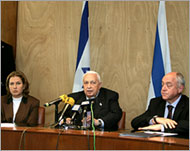Sharon: Peace deal priority
Confident of victory in March elections, Israeli Prime Minister Ariel Sharon says he’ll make “every effort” to reach a peace deal with the Palestinians in his third term.

Laying out his agenda, Sharon said the world has military options to halt Iran’s nuclear weapons programme, but that diplomacy should remain the first line of defence.
Sharon appeared relaxed in a wide-ranging question-and-answer session with Israeli news editors on Thursday, but largely evaded attempts to pin him down on policy details.
The prime minister has said his main goal in leaving the hardline Likud Party last week and forming a centrist movement, Kadima, was to make progress toward an agreement with the Palestinians.
Polls consistently have shown his new party coming out on top in 28 March elections, and able to hook up with the dovish Labour to form a stable coalition with a peacemaking agenda.
“I will win these elections,” Sharon predicted.
Road map
Sharon said he would “make every effort to advance the peace process”, repeating his commitment to the US-backed “road map” peace plan, which envisions a cessation of violence and the creation of an independent Palestinian state.
 |
|
Sharon (C) broke away from the |
However, he said Israel will keep large Jewish West Bank settlements in any peace deal and suggested that Israel would have a hard time giving up the West Bank’s Jordan Valley, on the border with Jordan, calling it a “security zone”.
He added that he does “not foresee” additional unilateral pullbacks, following the withdrawal from the Gaza Strip this summer.
He also said settlement construction is continuing in some areas, and that he will not encourage Israeli settlers living on the “Palestinian” side of Israel’s West Bank separation barrier to move back to Israel.
Government statistics released on Thursday said the Jewish settler population in the West Bank is expected to grow by 4.3%, or faster than in any other Israeli district, in 2005. The 243,000 settlers live among more than two million Palestinians in territory the Palestinians claim for a future state.
There has been growing speculation that a centre-left coalition led by Sharon would impose a peace deal in the event of a likely deadlock in negotiations with the Palestinians, and that Israeli troops and settlers would withdraw to the West Bank separation barrier, which would then become Israel’s de facto border.
Talks with Syria
Sharon also said he was in no rush to resume peace talks with Syria, which broke off in 2000. Restarting such negotiations would only ease US and French pressure on the Syrian regime, he said. “In my opinion, Israel should not surrender the Golan Heights,” he added, referring to the plateau Israel captured from Syria in the 1967 Mideast War and annexed in 1981.
|
“I will win these elections” Ariel Sharon, Israeli prime minister |
He also said Syria has not abandoned its ambitions to control neighbouring Lebanon.
Concerning Iran, Sharon said he was confident all diplomatic efforts would be exhausted before any international military action is taken – but that military capabilities exist.
Asked if any country is considering a strike against Iran to prevent it from developing nuclear weapons, Sharon replied, “I am sure that before anyone goes to take such steps, all attempts will be made to pressure Iran to stop all this activity”.
But the ability to carry out a military strike “of course exists”, he said.
Although Israel is preparing for the possibility that Iran will acquire nuclear weapons, it won’t lead the fight against the Islamic state’s nuclear ambitions, Sharon said.